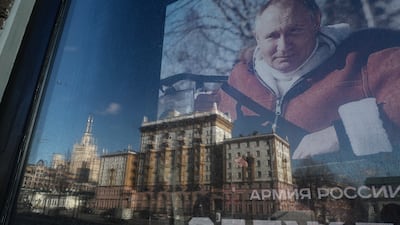To understand Russia in 2022, we need to begin in the 1990s.
May 1991 was a springtime of great celebration in the US and UK. The previous summer, Iraq's leader Saddam Hussein misread American diplomatic bumbling and invaded Kuwait. By February 1991, Saddam's army – the fourth largest in the world, supplied with tanks and other heavy weapons by the Soviet Union – was easily defeated by then US president George H W Bush's international coalition. British troops played a significant part.
That spring, Bush welcomed Queen Elizabeth II on a state visit to the American capital. This was not just a high point in the US-UK "special relationship", it was also a time of great western hubris. East Germany had abandoned communism and Germany was united. The Soviet Union was about to collapse, allowing Ukraine and other satellite nations to become independent democracies and capitalist economies. Iraq's Soviet-era heavy weapons were no match for American information-age technology, stealth aircraft and cruise missiles.
The West won the Cold War. And the Queen's address to a joint session of the US Congress was punctuated by numerous standing ovations, as she praised the triumph of western liberal democracy. "Just as our societies have prospered through their reliance on contract, not force, so too will the world be a better place for the spread of that mutual respect and good faith," she said.
American diplomats, scholars and commentators spoke of one superpower, the US, a "unipolar world", the triumph of liberal democracy and even the "end of history". But the Soviet commentator Georgy Arbatov prophesied – correctly – that the end of the external threat from communism would allow new internal divisions to take hold within the US. He said: "We are going to do a terrible thing to you. We are going to deprive you of an enemy."
The loss of the unifying Soviet threat meant some of the glue of a common struggle of western democracies against communist enemies crumbled. What was the point of Nato, countries spending money on a defensive alliance against a Soviet threat that no longer existed? Nato did expand eastwards, however, as did the EU. Estonia, Latvia, Lithuania and Poland were among the new accession countries. Others – Georgia and Ukraine in particular – were refused entry to the western club.
But now? Western celebratory hubris from the 1990s is long gone. Vladimir Putin has expanded Russian influence around the world, including the use of private Russian forces acting as mercenaries in various trouble spots. His relationship with the rising superpower China appears to be warm. And now the conflict in Ukraine has done something previously unthinkable – put Russian combat troops into battle in a major ground war in Europe, up to the borders of Nato.


Mr Putin offers various reasons for the invasion, but it's worth remembering what he was doing back in 1990 as the West triumphed and the Soviet Union collapsed. The Russian leader was at the time stationed in Dresden, part of communist East Germany until the Berlin Wall came down and Germany was united.
Three years ago, I visited Dresden to interview some of the leaders of the 1990 student protests that helped bring an end to communism. We met at the old headquarters of the feared East German secret police, the Stasi, and then moved a few hundred metres away to a very impressive large house in a wealthy area on the outskirts of Dresden. In 1990, it was Dresden's KGB headquarters.
One of the 1990 German protest leaders told me that a group of several thousand of them surrounded the headquarters until a KGB official opened the door. He very calmly instructed the protesters that the KGB was packing its bags and moving out but if any protester was crazy enough to try to enter the property they would be shot. The calm voice was that of Lt Colonel Vladimir Putin. The students took the threat seriously.
The events I described at the beginning of the piece as well as the Dresden story explain some of the very different mindsets of 30 years ago and their results, a legacy that is changing our world in 2022.
Mr Putin spent the past three decades trying to recreate his sense of Russia's destiny as a great power. He abandoned communism and embraced muscular revisionism, which western governments initially failed to recognise. To this day, he resents the failures of a weak Russia in the 1990s and wishes to rearrange the map of a continent in order to – as he would put it – rectify past mistakes. Others see it very differently. Over the past two years, I have talked with citizens of the Baltic republics who believe that the Nato umbrella will keep them safe, and with those in Georgia who fear that because they are denied Nato membership, they are the next targets for Moscow's new world order.
The late Arbatov's observation can now be turned on its head. Nato is being shaken and ultimately reinvigorated. European states, especially Germany, will begin to abandon their 20th-century illusions and implement big increases in defence spending.
It's not just Mr Putin who must rethink the past.


